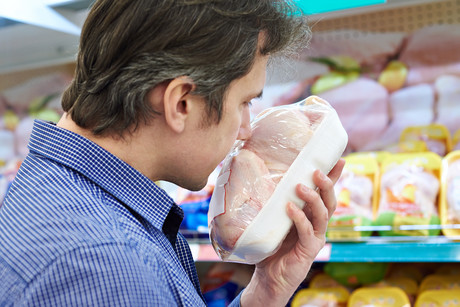Is that meat still OK?

With technology seeping into every industry, society is expecting everything to become more intuitive or ‘smart’, including packaging. Rather than continue to guess when food has spoiled, which leads to waste, consumers want to know definitively whether food is suitable for consumption or not.
Best before dates are currently the most commonly used indicator, but they are merely guidelines. New technology in the form of a tiny patch inside packaging may be able to replace these to show consumers if or when food should be disposed of.
McMaster researchers have developed a transparent test patch that can monitor for harmful bacteria such as E. coli and Salmonella and show contamination in real time.
“In the future, if you go to a store and you want to be sure the meat you’re buying is safe at any point before you use it, you’ll have a much more reliable way than the expiration date,” said lead author Hanie Yousefi, a graduate student and research assistant in McMaster’s Faculty of Engineering.
The test patch, called ‘Sentinel Wrap’, would be printed with harmless molecules which would detect pathogens inside the package and trigger a signal that could be read by a handheld device.
According to the researchers, mass producing the patch would be fairly inexpensive and simple, with assistant professor of mechanical engineering and member of the McMaster Institute for Infectious Disease Research Tohid Didar stating, “A food manufacturer could easily incorporate this into its production process.”
This has huge potential to help address foodborne illnesses, as statistics from the World Health Organization show that foodborne pathogens result in approximately 600 million illnesses and 420,000 deaths every year. The researchers suggested it may also have important applications in the medical industry, such as on bandages to detect an infection in a wound.
However, further studies are needed to develop the patch to detect other pathogens, and the researchers would need a commercial partner and regulatory approvals before it could go to market.
The findings were published in the journal ACS Nano.
Industry Code of Practice for plant-based food labelling
After a number of research studies, the Australian Government plans to strengthen plant-based...
2026 ANZ PIDA WorldStar winners announced
Seven Australian and New Zealand companies have received international recognition in the latest...
Celebrating 85th anniversary of CRYOVAC food packaging
Sealed Air Corporation is marking this milestone anniversary with a year-long celebration that...











